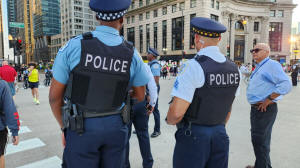|
University of Chicago Law School professor and Civil Rights and
Police Accountability Project founder Craig Futterman said a
panel of appellate court judges made the only decision they
could in upholding a lower court’s ruling stipulating that all
Chicago police officers facing serious misconduct allegations
must have their hearings heard in public.
“Holding these hearings in secret destroys public trust,”
Futterman told The Center Square. “People don't trust what they
can't see and a very first principle of policing is that we as
police officers work for the public, serve the public and are
accountable to the public. Among the lessons that have long been
learned is that accountable and transparent policing is
essential for public safety.”
In a move that upholds a Cook County judge’s earlier ruling, the
panel of three judges cited “police accountability and
transparency” concerns in rendering their decision. At the same
time, the ruling allows officers to continue having their fate
decided by an arbitrator as opposed to Chicago Police Board
members.
If upheld, the ruling could mean big changes for the system
after more than six decades of officers facing such disciplinary
proceedings having their fates wholly decided by board members.
Futterman is quick to add there is still much work to be done in
the name of greater transparency and accountability.
“One ruling doesn't solve all our problems,” he said. “If the
court did not stand up and speak up to protect police
accountability and transparency, we'd be in a heap of trouble.
We would essentially be undermining any form of police
accountability and transparency in Chicago and in the state of
Illinois.”
In the end, Futterman said such policy is a win-win situation
for all the parties involved.
“If you protect the minority of officers who are abusive or
racist and are acting as bullies or abusing their powers, people
aren't going to trust the 80-90% who aren't doing that stuff
because the message that sends to the public is the real police
are those officers who are protected,” he said. “That’s not in
the interest of the officers I admire and respect.”
Thus far in 2025, the Police Board has heard just one case and
in two others Chicago taxpayers have been forced to pay out at
least $12.75 million to resolve misconduct related lawsuits.
|
|




